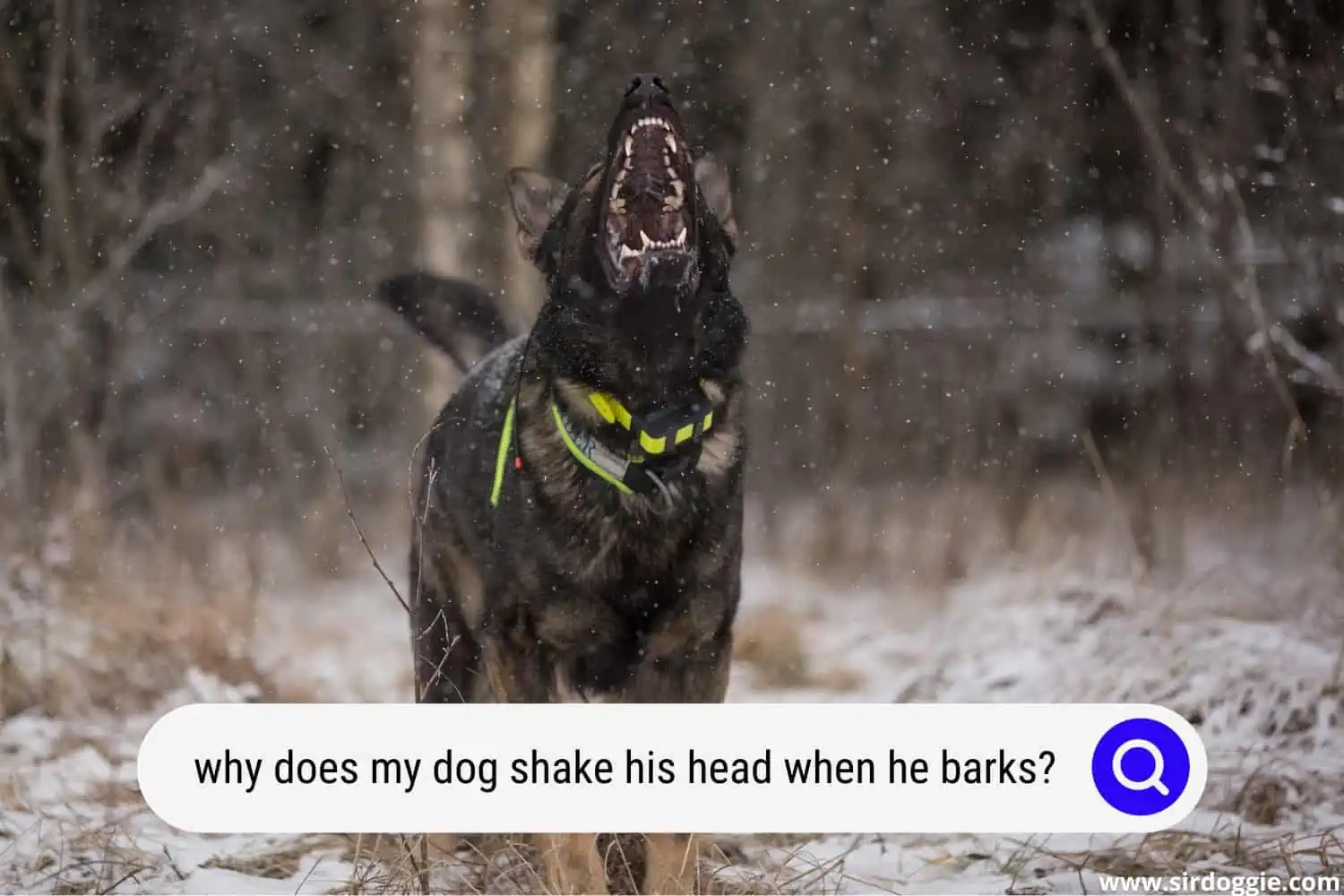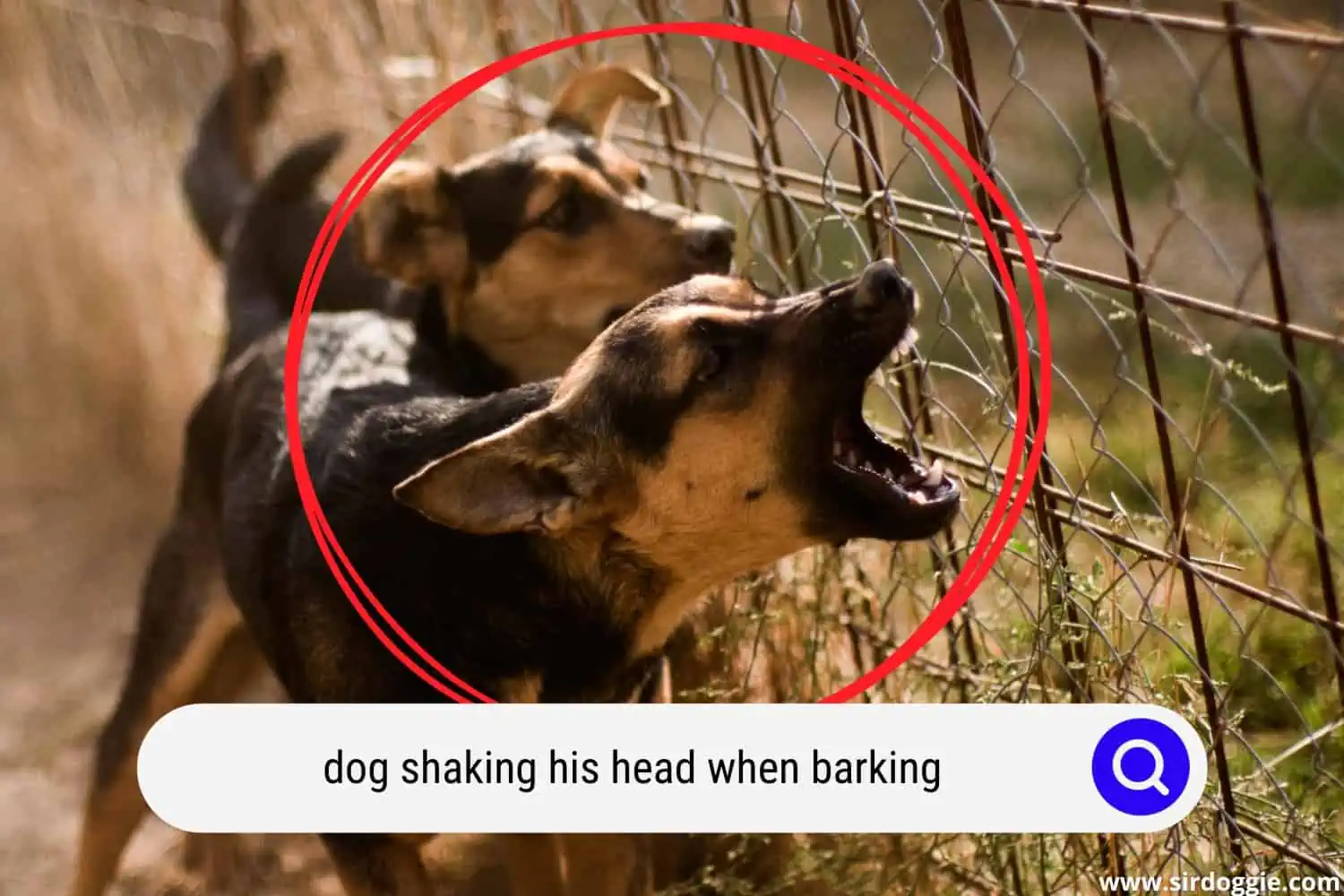Why Does My Dog Shake His Head When He Barks?
Are you a dog owner who is passionate and always with your furry friend? Does it worry you whenever you notice your dog shaking his head while barking? Despite the communication barriers we have with our dogs, they’re just like family and we all have an innate need to make sure they’re as happy and as well cared for as possible. Learning what some of your dog’s body language signals mean is one of the best ways to learn how they’re feeling so you know best what to do to ensure they’re healthy and enjoying life.

However, you should know that your dog may present some behaviors which are can be normal but may be a cause for concern if you see them repeated far too often. In a scenario where one of these signals is noticed frequently, you may need to consult your veterinarian to ensure your dog is healthy and not having any significant problems. Try not to put off an appointment for too long if the behavior persists, and visit your vet as soon as you notice any extremely strange behavior that could indicate something is wrong.
To answer the original question, though: Why does my dog shake his head when he barks?
This is not overly unusual and is a frequent sign! Your dog could be shaking their head to remove a foreign object that got lodged in their ear and could be causing itchiness, irritation, etc. It’s also a possibility that your dog has an ear infection that will need quick intervention by your veterinarian. There is also the risk of a neurological problem, hence the need to report early to your veterinarian for a prompt, clinical examination of your furry friend.
Sounds insightful, right? Keep reading to gain comprehensive knowledge of why your dog may shake his head while barking.
Dogs Shake Their Head While Barking Due to Excitement, the Presence of a Foreign Object in Their Ears, Ear Infections, or Neurological Causes
When your dog gets excited or becomes threatened, you will likely see him shaking his head when he barks. However, this does not happen frequently unless they are already prone to barking a lot. In that case, this behavior really isn’t something to be worried about, and your dog won’t need any present or future health care pertaining to it.
However, if your dog is an excessive barker, you can prevent that behavior by ensuring your dog isn’t exposed to any stimuli that would make them feel threatened and warrant the barking behaviors in the first place. They should be kept away from any environments or individuals that might provoke them to become startled and feel the need to bark and shake their heads.
Another reason your dog may shake its head when it barks is due to foreign objects getting lodged in its ear. These foreign bodies can lead to itching and irritation. When your dog becomes uncomfortable, he may feel this unusual ear sensation to be a threat, and he’ll bark and shake his head frequently to remove that unwanted irritant from his ear.
Ear infections are also a factor to consider when a dog is seen shaking its head excessively when barking. An ear infection can be in the outer ear or the inner ear, but it is mostly an inner ear problem. Therefore, it would be a good idea before running to the vet clinic to look inside of your dog’s ears and check for any signs of infection that may explain your dog’s acts of barking and shaking their head.
Below are some of the common ear infections that can make your dog shake his head when he barks:
1. Canine Otitis externa
This infection is characterized by an inflamed outer ear canal. Clinical signs associated with it include head shaking, swollen and red ears, ear scratching, an odor, and discharges. Allergies, floppy ears, ear mites, and trapped water are some of the common causes of dogs’ otitis externa. If left untreated, this could lead to permanent ear damage.
2. Ear vasculitis
This refers to the inflammation of the blood vessel walls in the ear flaps, resulting in a severe skin condition on the flaps of your dog’s ears. Some of the common symptoms seen with ear vasculitis include ears with red or purple spots, skin crusts, fluid-filled cysts, alopecia (hair loss), itchiness, and pain at the site of infection.
Some other potential causes for excessive head shaking when barking can include ear trauma or an ear hematoma, which is when a pool of blood accumulates between the skin and cartilage of a dog’s ear flap, causing discolored skin, bleeding, swelling, and pain. There are commercially available antibacterial, antifungal, and anti-inflammatory ointments used against ear infections. Nevertheless, it is a must that you contact your veterinarian to properly assess your dog so they can prescribe the correct ointments and other necessary medications in the right dosages.
In some instances when your dog shakes his head when he barks, there may be a neurological problem. In that case, a quick trip to the nearest veterinary clinic is essential, and it is very important to inform your veterinarian of the complete history of what your dog is going through to ensure a better diagnosis and the correct medical intervention.
Head shaking when a dog barks can also be attributed to an illness called vestibular disease. The disease is commonly seen along with other signs or symptoms like walking in a circle, scratching at the ear, ataxia (impaired coordination), abnormal head posture, frequent head tilt, or signs of dizziness such as vomiting and nausea. In that case, your dog is experiencing a serious condition that can be a result of several possible problems ranging from severe infections to neurologic problems. Regardless, these will warrant the prompt intervention of your veterinarian.
Therefore, whatever the cause may be for what you may have noticed as a precursor to your dog shaking his head when barking, resist the urge to handle these health concerns by yourself. Whether it is serious or not, try to visit your nearest animal clinic or hospital to consult a veterinarian and get the best medical intervention and advice as soon as possible.
Should I Ignore My Dog When He Barks?
Don’t always ignore your dog when he barks as you are not always aware of the situation causing your dog’s distress. There are usually two common reasons for barking, and these are either your dog needs your attention and help or your dog is feeling threatened by some type of problem.
If you’ve ascertained that your dog needs your attention only to come and play with him after being fed and any other daily care, this would be a time it would be okay to choose to ignore the barking since it’s not a serious situation. However, in the event that you were to see your dog being threatened by another animal or a stranger, immediately involve yourself and try to calm it down. If you notice any recurring unusual behaviors (like head shaking when he barks), consult your veterinarian for further advice.

Related Question
How Do I Get My Dog to Stop Barking Unnecessarily and Shaking His Head?
One effective way to stop your dog from barking unnecessarily is to get him a certified dog trainer who can handle that unwanted behavior and train your dog to be friendly and smart. To stop him from shaking his head, the first thing to figure out is the cause of the issue, and this can lead to your veterinarian for better diagnosis and proper treatment if something is significantly wrong.

Family Dog Expert Author
Hi there! I’m Stuart, a devoted dog lover and family dog expert with over a decade of experience working with our furry companions. My passion for dogs drives me to share my knowledge and expertise, helping families build strong, loving bonds with their four-legged friends. When I’m not writing for SirDoggie, you’ll find me hiking, playing with my beautiful dog, or studying music.